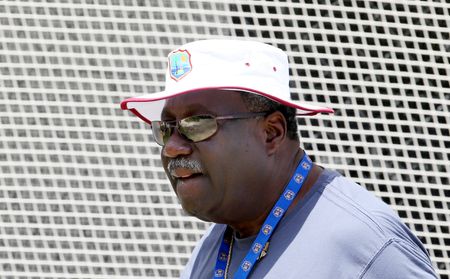By Ahmed Elumami and Ayman al-Warfali
TRIPOLI/BENGHAZI, Libya (Reuters) -Libya’s parliament said Friday’s planned presidential election would not go ahead, leaving the internationally-backed peace process in chaos and the fate of the interim government in doubt.
The electoral commission proposed pushing back the voting date by a month, confirming a delay that had been widely expected amid disputes over the rules, including the eligibility of several divisive candidates.
Disagreements showed the limitations of a winner-takes-all presidential vote involving candidates viewed as unacceptable in large parts of the country, including the son of the late ruler Muammar Gaddafi and a military leader who assaulted Tripoli.
At stake is a peace process that had been seen as the best hope in years of bringing an end to the decade of chaos and violence that has engulfed Libya since a NATO-backed uprising ousted Gaddafi in 2011.
Large numbers of Libyans had already registered for voting cards for the election in what politicians on all sides in Libya have said is a sign of strong popular desire for a vote. The U.S. ambassador on Wednesday said work towards elections should remain a priority.
However, with mobilisations in Tripoli and other western areas by armed groups, the collapse of the electoral process risks aggravating local disputes and triggering a new round of fighting.
Disputes over the path forward could also undo the wider U.N.-backed peace process between Libya’s main eastern and western camps that have maintained a ceasefire since last year.
Renewed conflict could also lead to more frequent or extensive shutdowns in oil output by armed groups, hitting state finances. A group this week closed down three major fields.
Some figures in the east have warned of a new breakaway government that would return Libya to the division between warring administrations that lasted from the last election in 2014 until the installation of the current interim government.
Turkey and regional adversaries that backed opposing sides in Libya have improved relations recently, easing the risk they will drive a return to war through local proxies, analysts say.
Factions, candidates and foreign powers have been talking behind the scenes about whether an election can still take place with a short delay or whether a longer postponement is necessary to reach agreement on the legal basis of the vote.
Meanwhile, the status of the interim government that was installed in March as part of the same peace process is also at risk, with the eastern-based parliament having withdrawn confidence from it in September.
DISPUTES
The electoral committee’s statement on Wednesday added that the government’s mandate would expire on Friday. However, other main factions and political institutions may stick with the government, which is also recognised by the United Nations.
The election was originally called through a U.N.-backed roadmap that envisaged simultaneous parliamentary and presidential elections on Dec. 24 – Libya’s national day.
However, there was no agreement on the constitutional basis for the election or on the rules among the fragmented political institutions.
A law issued in September by parliament speaker Aguila Saleh that split the presidential and parliamentary votes to different dates was rejected by other leading factions but still formed the basis of the push towards elections.
With little agreement on the rules, or on who would enforce them or adjudicate disputes, the entry of highly divisive candidates into the presidential race triggered the collapse of the process.
Electoral commission head Emad Sayeh said in a statement that the process had run into trouble because the rules were not adequate to handle appeals and disputes over eligibility.
The three most prominent candidates, eastern commander Khalifa Haftar, Saif al-Islam Gaddafi and interim Prime Minister Abdulhamid al-Dbeibah, were also the three most divisive.
Haftar was unacceptable to many in western Libya after his 2019-20 assault on Tripoli that smashed parts of the capital. Gaddafi was convicted of war crimes by a Tripoli court and is detested by many of those who fought in the 2011 revolt.
Dbeibah had promised when he was installed as premier that he would not run in an election and his continued work as prime minister in the run-up to the vote led many of his rivals to say he had an unfair advantage.
(Reporting by Ayman al-Warfali and Ahmed Elumami; Writing by Angus McDowall; Editing by Angus MacSwan)








